In observation of World AIDS Day this year GLAAD reached out to the Gilead COMPASS Initiative‘s grassroots partner organizations who are working tirelessly to uplift their communities in the U.S. South.
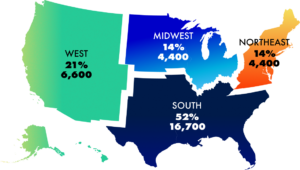
As of 2021, the South accounted for more than half (52%) of new HIV diagnoses in the United States. These nonprofit organizations are committed to fighting against the systemic racism, poverty, and healthcare inequities that enforce these statistics in the south.
GLAAD connected with some of the COMPASS partner organizations, who received grants from Gilead to continue their work on the ground, to learn more about the current realities they face in this part of the country. The organizations were asked about the challenges they face regarding HIV prevention and care in the communities they serve and what wins they had this year.
THE KNIGHTS & ORCHIDS SOCIETY INC.
TC Caldwell, Executive Director, The Knights & Orchids Society
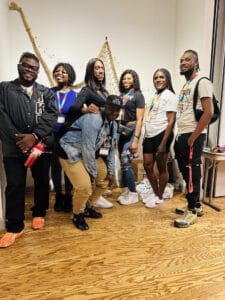
They shared that, “Many of the people we serve are surviving. Before we can even mention HIV prevention or care, we have to address housing insecurity, food insecurity, and the need for affirming safe spaces. Direct support and mutual aid are needed in this work. We can’t get to zero if we don’t address all the needs.”
In terms of wins, they shared that, “We went through a transition that has strengthened our work and commitment to each other(staff), clients, and our community. We were able to create and strengthen new community partnerships. We were able to add more clients. Our virtual healing spaces increased. We have a presence on at least 3 HBCU [campuses] Our testing outreach has expanded.”
AIDS ALABAMA SOUTH
ALABAMA LATINO ACCESS CENTER
Jean Hernandez, Latinx Program Coordinator, Alabama Latino Access Center
ALABAMA LATINO ACCESS CENTER
Jean Hernandez, Latinx Program Coordinator, Alabama Latino Access Center
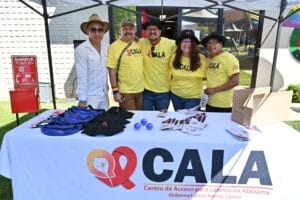
Hernandez explained that, “Centro para Acceso para Latinos de Alabama /Alabama Latino Access Center (CALA) serves Latine communities living with HIV, LGBTQ+, and Immigrant communities in urban and rural areas throughout the state.”
She said, “Navigating the intersections of HIV with immigration policies, anti-LGBTQ policies, hate, language barriers, HIV stigma, lack of insurance, and poverty makes it more complicated in Alabama because of the political and social marginalization. All of our clients are first-generation immigrants, and their social determinants of health are not prioritized in Alabama.
We will be contributing to more health disparities and stigma if we don’t implement policies that provide better access to language justice, medical care, HIV prevention, mental health, substance abuse programs, and research/studies for Latine-focused programs; lack of cultural responsiveness on local and state levels increase the risk for our communities to be vulnerable; vulnerability impacts their physical well-being and psychological outcomes.
We are dealing with an increase of hate and discrimination in Alabama, which has severe implications for public health, mental health, and stigma. We have a responsibility to our communities to advocate for more awareness about HIV, the LGBTQ+ community, and HIV prevention and HIV stigma. We can’t do this fight alone. Latine people are most likely to be denied some services upon eligibility and experience more barriers, but nothing prevents a provider from practicing cultural humility, exercising language justice, and advocating for social justice—NOTHING! You can save a life.”
She also shared that, “After a challenging year of attacks, hate, and lack of funding, we are finding strength in our community and coworkers. We have our voices, and we are here to stay and fight HIV stigma and institutional racism. We are the only program dedicated to Latine people living with HIV and LGBTQ+ Latine people in Alabama, and we are providing a platform for our communities for more visibility, resiliency, and empowerment. We are currently in the process of having our 501 c3 nonprofit status and expanding our staff and services to help more people. We can’t do this without the help of the community, our clients, and our advocates. Thanks to our sponsors and people supporting our program, we helped more than 25 people with financial immigration assistance through collaborating with legal clinics; additionally, we are helping more than 130 clients and immigrant communities safe in Alabama with the ability to access justice.”
MY SISTAH’S HOUSE
Kayla Gore, Executive Director, My Sistah’s House Memphis
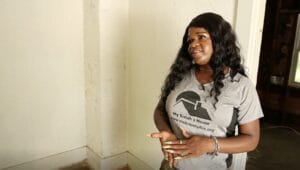
Gore shared that, “One of the most challenging aspects is collaboration with larger organizations due to staff capacity or lack thereof. This [COMPASS] initiative allowed us to work with organizations across the South, the local community, public servants, and, most importantly, residents on projects that encourage safer, trauma-informed spaces.”
She also shared that, “Our wins this year included being able to continue working in light of the political climate. We formed more collaborations and partnerships that strengthen our programs and resources for people living with HIV, those affected, and those at risk.”
NAESM
Dr. Alvan Quamina, Executive Director, NAESM
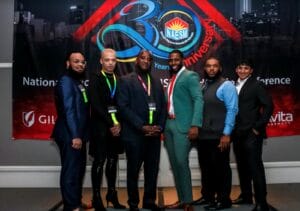
Dr. Alvan Quamina explained that, “The most challenging aspect for NAESM in addressing HIV prevention and care for Black LGBTQ people lies in overcoming the deep-seated social and systemic barriers that disproportionately affect this community. These challenges include stigma related to both HIV and LGBTQ identities, discrimination within healthcare systems, limited access to culturally competent care, and the ongoing effects of systemic racism and poverty.
Additionally, misinformation and mistrust of healthcare institutions, often stemming from historical injustices, create significant hurdles in engaging Black LGBTQ individuals in prevention and treatment programs. NAESM must also address disparities in housing, employment, and mental health care, which can exacerbate vulnerability to HIV.
Despite these challenges, NAESM remains dedicated to providing culturally affirming, holistic services tailored to meet the unique needs of Black LGBTQ people, ensuring equitable access to prevention, care, and support.”
Dr. Alvan Quamina also shared their wins!
“In 2024, NAESM achieved several significant milestones:
- 20th Annual National African American Leadership Conference: Celebrated in St. Louis, Missouri, this conference marked two decades of commitment to addressing health disparities and social justice within the Black LGBTQIA+ community.
- Expansion of Housing Services: NAESM continued to provide essential housing assistance, including short-term rental and utility support, as well as aid with deposits and first month’s rent for individuals living with HIV. Plans are underway to introduce emergency lodging assistance and long-term rental subsidies, further enhancing support for those in need.
- Behavioral Health and Substance Use Counseling: The organization offered licensed behavioral health services to HIV-positive individuals and Black gay and bisexual men, regardless of HIV status, addressing mental health and substance use challenges within the community. Through partnerships, we re-established our support group offerings.
- Total Life Care Center: In January 2024, NAESM proudly opened the Total Life Care Center, a groundbreaking initiative dedicated to providing high-quality STI treatment and HIV care, with a primary focus on serving Black gay and bisexual men. This state-of-the-art facility represents NAESM’s commitment to addressing the unique healthcare needs of this community with culturally competent, compassionate, and comprehensive services.
- Global Network of Black People Working in HIV: In 2024, NAESM proudly assumed the housing of the Global Network of Black People Working in HIV (GNBPH), solidifying our commitment to fostering collaboration and amplifying the voices of Black professionals and advocates in the fight against HIV. This partnership marks a pivotal step in uniting efforts to address the unique challenges Black communities worldwide face in HIV prevention, care, and advocacy.”
COMMUNITY HEALTH PIER PREVENTION INTERVENTION EDUCATION & RESEARCH
Cedric Sturdevant, Executive Director, Community Health Pier
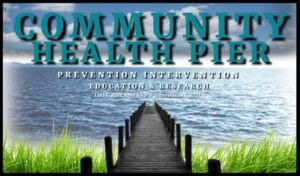
Sturdevant said the biggest challenges the organization face are, “Stigma, discrimination, and healthcare access disparities remain significant barriers to HIV prevention and care in the Mississippi Delta and across the South. Communities often face societal judgment, religious opposition, and cultural stigma, making individuals less likely to seek testing and care or openly discuss HIV-related issues. Many rural and underserved areas have limited access to healthcare facilities, providers knowledgeable about HIV care, or affordable treatment options—this includes a lack of pre-exposure prophylaxis (PrEP) access and culturally competent providers. For people in rural or isolated communities, the ability to physically access care or attend community events is hindered by a lack of transportation options.
Many individuals living with or at risk for HIV also face co-occurring mental health challenges or trauma. Providing adequate support and integrating mental health into care requires additional expertise and resources. Retaining and training staff with technical skills and cultural competence is vital, but it can be difficult in under-resourced areas.”
He shared their biggest successes as well:
“In 2024, Community Health PIER (CHP) achieved several significant milestones in its mission to enhance health equity in the Mississippi Delta region:
- Expansion of Health Programs: We broadened initiatives to address critical health issues, including HIV/AIDS prevention, nutrition, and mental health services. These programs have been instrumental in decreasing the gap between the community and essential health resources.
- Get To Know Me Campaign: The organization launched the 2nd year of Get To Know Me /Stop The Stigma campaign, aiming to raise awareness about HIV-related stigma through various channels such as social media, education, and billboards. This initiative has reached numerous organizations, including schools, churches, and workplaces, providing vital information and resources on HIV/AIDS prevention and management.
- Agricultural Training and Food Security: We continued our Watch Us Grow program, which connects middle and high school students with farmers to impart agricultural knowledge. This program has been pivotal in promoting food security by enabling families to grow fresh produce, thereby enhancing their diets and overall health.
- Support for Black Gay Men: Through the Black Gay Men Movement (BGMM), CHP provided Black men with access to comprehensive career development, health education, and professional mentorship, fostering personal and professional growth within the community.
- Women’s Advocacy and Support: The ICare Support Group offered a platform for women to share, discuss, and advocate for issues impacting them, promoting empowerment and community engagement. These accomplishments underscore Community Health PIER’s dedication to improving health outcomes and fostering a healthier lifestyle in the Mississippi Delta region.”
The Gilead COMPASS Initiative is working to address the HIV/AIDS epidemic in the Southern United States by collaborating with local community organizations and stakeholders to use evidence-based solutions to meet the needs of people living with and impacted by HIV/AIDS. Learn more here.
Learn more about the current state of HIV in the United States in GLAAD and the Gilead COMPASS Initiative’s 2024 State of HIV Stigma Report.












